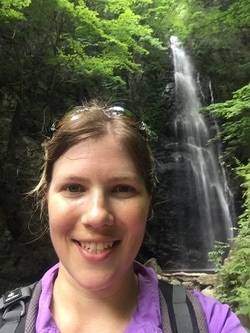Dr. Elizabeth KierepkaBroadly, I am interested in how landscape heterogeneity and species’ ecologies interact to create genetic structure, particularly in vertebrates. Much of my work falls under landscape genetics where I involved in a diversity of projects such as hybridization dynamics, genetic mark-recapture, phylogeography, and genetic impacts of fragmentation and habitat loss. Landscape genetics is a highly integrative field that has allowed me to diversify my skillset into spatial statistics, simulation modeling, and GIS technology while still maintaining my original passion for investigating both evolutionary and conservation-based questions in my academic career. I really enjoy investigating a diverse number of subjects and study organisms within ecology, and landscape genetics provides an ideal toolset for many study systems.
Much of my previous work has focused on utilizing genetics to fill in knowledge gaps about wide-ranging, overly abundant, and/or highly mobile organisms. My MS and PhD projects focused on the American badger, an elusive mustelid that presents a number of difficulties in sampling and model optimization for landscape genetics. I was able to use simulations to identify statistics that were appropriate for species with little life history data and investigate inherent biases in opportunistic sampling. My postdoctoral position at the Savannah River Ecology Laboratory at the University of Georgia allowed me to investigate invasive species (i.e., wild pigs and brown treesnakes), source-sink dynamics in raccoons, coyote recovery after intense trapping, and the effects of fragmentation and habitat loss on forest-associated rodents. My current postdoctoral research at Trent University involves a comparative investigation of genetic structure across mesocarnivores to identify life history traits that predict genetic differentiation in Canada. I am also investigating the effects of spatial ambiguity on landscape genetic results. Additionally, I serve as a trainee rep on the advisory committee for the NSERC funded Collaborative Research and Training Experience (CREATE) program at Trent University. |
Education & Academic Positions |
|
Peer-reviewed Articles in Scholarly Journals
Latch, EK, Kierepka, EM, Heffelfinger, JR, & Rhodes Jr, OE. (2011). Hybrid swarm between divergent lineages of mule deer (Odocoileus hemionus). Molecular Ecology 24: 5265-5279.
Kierepka, EM, Latch, EK, & Swanson, BJ. (2012). Influence of sampling scheme on the inference of sex-biased gene flow in the American badger (Taxidea taxus). Canadian Journal of Zoology 90: 1231-1242.
Anderson, SJ, Kierepka EM, Latch EK, Swihart RK, Rhodes OE (2015). Assessing the
permeability of landscape features to animal movement: the value of using genetic legacies. PloS One 10: e0117500.
Kierepka, EM & Latch, EK. (2015). Performance of partial statistics in individual-based landscape genetics. Molecular Ecology Resources 15: 512-525.
Kierepka, EM & Latch, EK. (2016). Fine-scale landscape genetics of the American badger (Taxidea taxus): disentangling landscape effects and sampling artifacts in a poorly understood species. Heredity 116: 33-43.
Kierepka, EM & Latch, EK. (2016). High gene flow n the American badger overrides habitat preferences and limits broadscale genetic structure. Molecular Ecology. Doi: 10.1111/mec.13915.
Kierepka, EM, Anderson, SJ, Swihart, RK, & Rhodes Jr, OE. (2016). Evaluating the influence of life history characteristics on genetic structure: a comparison of small mammals inhabiting complex agricultural landscapes. Ecology and Evolution 6: 6376-6396.
Kierepka, EM, Unger, SD, Keiter, DA, Beasley JC, Rhodes Jr OE, Cunningham FL, & Piaggio AJ. (2016). Identification of robust microsatellite markers for wild pig fecal DNA in humid climates. Journal of Wildlife Management, 80, 1120-1128.
Kierepka, EM, Kilgo, JC, & Rhodes Jr, OE [in revision]. Effect of trapping on the fine-scale genetic structure of coyotes on the Savannah River Site, South Carolina. Journal of Wildlife Management.
Latch, EK, Kierepka, EM, Heffelfinger, JR, & Rhodes Jr, OE. (2011). Hybrid swarm between divergent lineages of mule deer (Odocoileus hemionus). Molecular Ecology 24: 5265-5279.
Kierepka, EM, Latch, EK, & Swanson, BJ. (2012). Influence of sampling scheme on the inference of sex-biased gene flow in the American badger (Taxidea taxus). Canadian Journal of Zoology 90: 1231-1242.
Anderson, SJ, Kierepka EM, Latch EK, Swihart RK, Rhodes OE (2015). Assessing the
permeability of landscape features to animal movement: the value of using genetic legacies. PloS One 10: e0117500.
Kierepka, EM & Latch, EK. (2015). Performance of partial statistics in individual-based landscape genetics. Molecular Ecology Resources 15: 512-525.
Kierepka, EM & Latch, EK. (2016). Fine-scale landscape genetics of the American badger (Taxidea taxus): disentangling landscape effects and sampling artifacts in a poorly understood species. Heredity 116: 33-43.
Kierepka, EM & Latch, EK. (2016). High gene flow n the American badger overrides habitat preferences and limits broadscale genetic structure. Molecular Ecology. Doi: 10.1111/mec.13915.
Kierepka, EM, Anderson, SJ, Swihart, RK, & Rhodes Jr, OE. (2016). Evaluating the influence of life history characteristics on genetic structure: a comparison of small mammals inhabiting complex agricultural landscapes. Ecology and Evolution 6: 6376-6396.
Kierepka, EM, Unger, SD, Keiter, DA, Beasley JC, Rhodes Jr OE, Cunningham FL, & Piaggio AJ. (2016). Identification of robust microsatellite markers for wild pig fecal DNA in humid climates. Journal of Wildlife Management, 80, 1120-1128.
Kierepka, EM, Kilgo, JC, & Rhodes Jr, OE [in revision]. Effect of trapping on the fine-scale genetic structure of coyotes on the Savannah River Site, South Carolina. Journal of Wildlife Management.
Contact:
office: Life & Health Sciences Building, Room D223
tel: (705) 748-1011 x6127
email: elizabethkierepka[at]trentu[dot]ca
Researchgate: https://www.researchgate.net/profile/Elizabeth_Kierepka
office: Life & Health Sciences Building, Room D223
tel: (705) 748-1011 x6127
email: elizabethkierepka[at]trentu[dot]ca
Researchgate: https://www.researchgate.net/profile/Elizabeth_Kierepka
